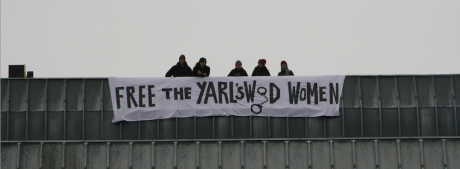
Saturday, 5th of March 2011
It is wet and foggy in the fields of Bedfordshire and our shoes fill with mud as we walk away from the group of policemen that have followed us in a circle along the fences of Yarl’s Wood migrants’ detention centre. This Saturday, the 5th March, as women demonstrate in London at the start of International Women’s Week, a group of migrant rights, no border and feminist activists travel to Bedford to bring our solidarity to the migrant women (and men) detained in Yarl’s Wood. We manage to reach the women locked in one of the units. At a distance, we can’t talk to the imprisoned women, but we can chant with them. We cannot hear exactly what they say but one message arising across the barbed wires is simple, loud and clear: ‘freedom, we want freedom’.
Yarl’s Wood is one of the seven privately run ‘Immigration Removal Centres’ in the UK, detaining ‘irregular migrants’ on behalf of the UK Border Agency. Initially the building accommodated 900 people in two blocks, making it the largest immigration prison in Europe. In February 2002 the capacity of the centre was reduced after one of the buildings was burnt down during a protest organized by detainees against staff harassment. At present the centre is composed of 4 units ‘hosting’ about 400 people.
In February of last year, the situation in the removal centre again exploded. The horrible conditions of detention were denounced by migrant detainees as some women decided to start a hunger strike demanding an end to indefinite and abusive imprisonment. In an attempt to end their protest, the management subjected many of the women to violent attacks and various forms of punishment. At that time six women detainees, accused of being ‘ring-leaders’, were moved into isolation and prisons.
On the 25th January, after almost a year in Holloway prison, Denise McNeil, one of the `leaders’, was granted bail at an immigration court. Two women still remain in jail without charge: Aminata Camara and Sheree Wilson. Activists from the campaign to Free the Yarl’s Wood 3, including members of No One is Illegal, No Borders, Crossroads Women’s Centre, Communities of Resistance, Stop Deportation Network and members of the RMT, filled the court for Denise’s bail hearing. They provided an important support and will keep campaigning ‘for Sheree and Aminata and all the people in Yarl’s Wood until the centre will be closed’. (For updates, see Free the Yarl’s Wood 3 campaign Facebook page http://www.facebook.com/pages/Free-Denise-Now/174533002581566 and Twitter feed: @freedenisenow. Also see the NCADC site: http://www.ncadc.org.uk/campaigns/DeniseMcNeil.html).
The reasons for the detention of people in centers like Yarl’s Wood are multiple, and sometimes quite different. One of the activists involved in the campaign to support the hunger strikers explained to me that many of the women who end up in detention have already served a prison sentence, often for a minor offence, such as using fake documents to travel or work. Rather than being released, these women are transferred back to detention as a ‘second punishment’ where they wait for their immigration case to be cleared and eventually granted status or deported. They are trapped in an indefinite space of juridical and existential limbo, from one prison to the other, on the grounds that their migration case is still ‘pending’: they cannot be returned to their country of origin (on complex juridical or humanitarian grounds), and yet their status as asylum seekers is not recognized either.
Denise has just been released on bail, and her status, as well as her future stay in the UK, remains uncertain. However, her case shows how important the external support of migrants’ rights activists to sustain legal individual cases can be by helping access legal advice and to build publicity around their otherwise invisible stories. While it may appear only a small achievement, these forms of solidarity provide the migrant women with encouragement and help instill confidence as they engage in the hard battles for freedom of movement and the right to stay in a country where they have worked and toiled for many years. In many cases the women are ‘caught’ by the UK Border Agency after many years of residence in the country, where they have probably built a family, found work and made a home. This is a typical story for the women detained in Yarl’s Wood.
(Photo Credit: Open Democracy / IndyMedia.UK)